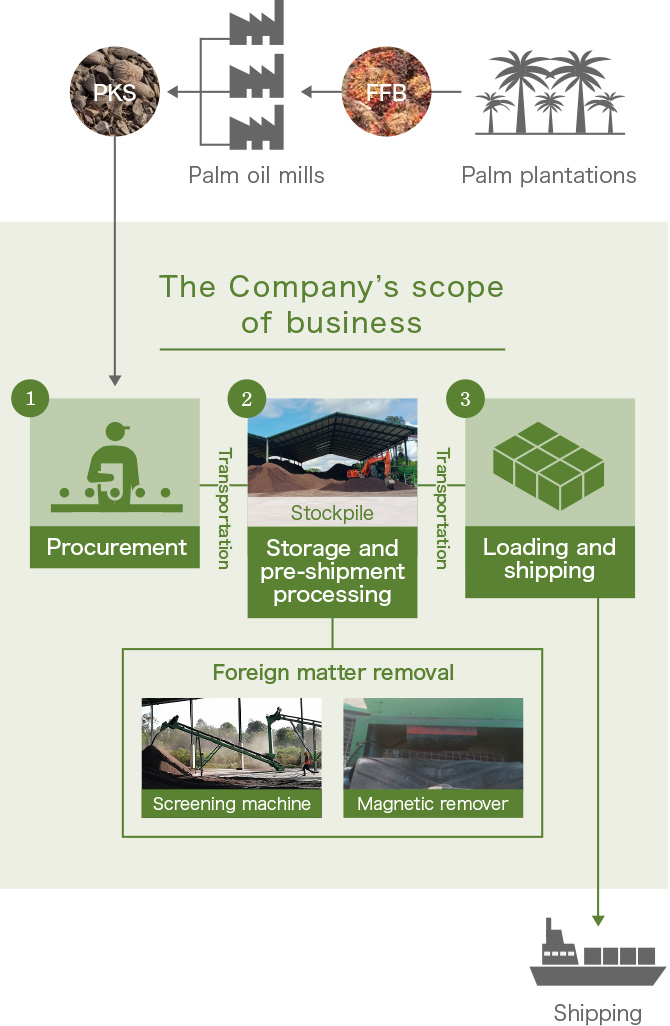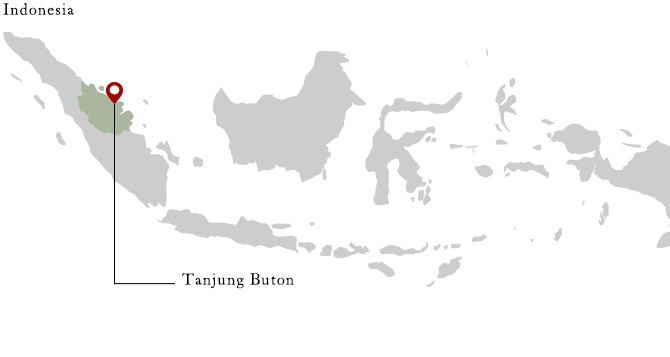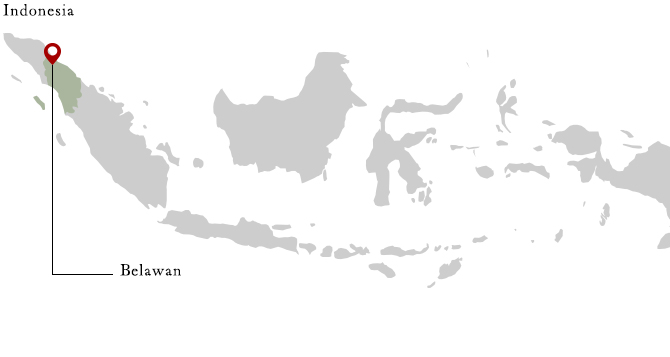Business Outline
Our Business
The Company operating in Sumatra, Indonesia, sells PKS fuel to Japanese power plants from the Company’s stockpile.


The Company’s strengths
The Company provides a long-term and stable supply of high-quality PKS fuel that meets our customers’ quality requirements through the integrated management of processes carried out in the presence of local personnel in charge from procurement, transportation, storage, sorting, and loading to shipment of PKS fuel to ensure that it is delivered and received on schedule.
- (1) Strengths in “procurement”
- The Company’s local personnel in charge actually visit palm oil mills to conduct inspections and check the quality conditions, etc. before procuring high-quality PKS fuel. Having obtained GGL certification in December 2021, PKS fuel generated by our supplier-verified (internally audited) palm oil mills is treated as GGL-certified product. Company President Dikki Akhmar also serves as Chairman of the PKS Entrepreneur Association of Indonesia (APCASI), the first PKS fuel industry association in Indonesia established in 2010, and utilizes his deep knowledge of PKS fuels and extensive network of suppliers in the procurement of PKS fuel.
- (2) Strengths in “storage and pre-shipment processing”
- Our stockpile is equipped with a covered yard and a concrete floor to control moisture content and other properties of PKS fuel and to prevent foreign matter such as gravel from entering the fuel. In addition, sorting by screening machines and magnetic removers ensures higher quality product control and delivery of PKS fuel that meets the quality requirements of our customers.
- (3) Strengths in “loading and shipping”
- The Company’s stockpile is situated in the shortest distance from Port, which allows for speedy shipping.
- [What is FFB?]
- FFB is an abbreviation for Fresh Fruit Bunch and refers to palm fruits harvested from palm trees.
- [What is PKS?]
- PKS is an abbreviation for Palm Kernel Shell, which is the palm shell left over after palm oil is extracted from the seeds of the palm tree. Electricity generated using PKS as fuel is attracting attention as electricity to be purchased under the Feed-in Tariff (FIT) Scheme for Renewable Energy and as clean energy because it reduces the carbon dioxide emission factor.
- [What is GGL certification?]
- Launched in 2002, GGL certification is one of the long-established sustainable biomass certifications and is a scheme that provides assurance that the biomass products procured have been produced in a sustainable manner. In Japan, it is one of the third-party certifications stipulated in the Guidelines for the Formulation of Business Plans (Biomass Power Generation) for the FIT Scheme for Renewable Energy.
Warehouse Information
■ Near Tanjung Buton Port, Riau Province, Sumatra, Indonesia
- Basic specifications
- ・Site area: Approximately 40,000 ㎡ (*equivalent to approximately one Tokyo Dome)
- ・PKS storage capacity quantity (under roof): 12,000 MT
- ・Automatic weight scale (during loading/unloading): 60 MT
- ・Screening machine: 700 MT/day (with two units)
- ・Magnetic remover: 40 cm x 20 cm x 5 cm

■ Near Belawan Port, North Sumatra Province, Sumatra Island, Indonesia
- Basic specifications
- ・Site area: Approximately 6,000 ㎡
- ・PKS storage capacity quantity (under roof): 16,000 MT
- ・Automatic weight scale (during loading/unloading): 60 MT
- ・Screening machine: 1,500 MT/day (with a unit)
- ・Magnetic remover: 40 cm x 80 cm x 40 cm





